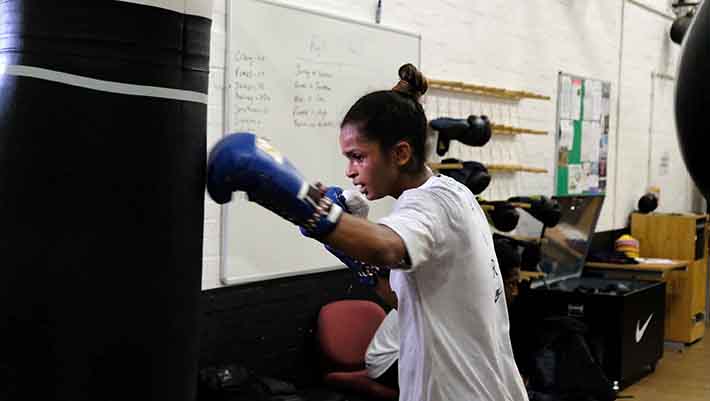(CNN) — She pants from exhaustion, sweat dripping down her forehead and over a bruise or two as practice finishes.
It’s all part of Ramla Ali’s routine, twice a day, six days a week, either on the track or at the gym. It is what it takes to be a champion in boxing, but Ali doesn’t mind it.
In fact, she relishes it.
“It’s a little bit of an addiction,” she explains. “You just want to train harder so you can win another fight, so you can be better than you were yesterday”.
And it’s been like that since the Londoner won her first bout as a teenager: “The moment the referee puts your hand up, it’s such a high, such a rush, and you just want more of it.”
Her big moment came in 2016 when, against all odds, Ali won the British title in her weight category (54 kilograms).
“I went in there a bit of a like an underdog,” she recalls. “I was so scared when I saw the list [with the other fighters] and I ended up beating them and came out on top.”
“I think that was one of my proudest moments to date”.
The 27-year-old’s glory in Britain is a far cry from her birthplace in Somalia, where civil war forced her family to flee when she was just two years old.
“The reason why we came here is because my eldest brother died in the war,” Ali says, “He was struck by a grenade as he played outside the house. Obviously from then, my mom didn’t want that life for us.”
In a tale that’s all too familiar these days, her family packed up and set off to Kenya in an overcrowded boat.
“Five hundred people were just climbing on, trying to survive,” Ali’s mother told her. “A lot of people died along the way.”
Ali herself almost didn’t make it, becoming violently ill and losing a lot of weight during the journey.
Ali and her family eventually made it to the UK where they were given refugee status, but her trials didn’t end there. Struggling to fit in at school, Ali was teased because of her size.
“I was bullied a bit, for being overweight,” she recalls. “The girls [at my school] were quite slender in frame and here’s me standing out.”
Ali’s mother tried to boost her confidence with a membership to a local sports center, where she tried a few classes until she stumbled across a boxercise session.
Ali liked it so much that she started looking for more classes. “I searched on the internet, any local clubs that taught boxing and that’s how I found it really,” she says.
“I thought, ‘Wow, I love this.'”
Practicing in hiding
Ali fell in love with boxing but struggled as she tried to practice the sport openly.
Her parents, very conservative Muslims, initially called the sport unacceptable for a girl and pushed her to quit.
“For a very long time I’ve kept it hidden from my family,” Ali says. “I remember sneaking out, telling them I was just going to the park for a run. But really and truly I was going to train in the boxing gym.”
“I’d come home with black eyes and have to explain it. ‘Oh, I got into a fight in school.'”
With the assistance of her younger brother — who would help her sneak out — Ali kept fighting, chasing the rush that hooked her from the start and finding comfort in a welcoming ring where she could just be herself.
“Everyone is equal in boxing,” Ali says. “It’s just one boxer versus another boxer.”
Ali also volunteers for the London-based charity “Fight for Change,” hosting weekly boxing and self-defense classes just for women. Many of her students wear headscarves and struggle to find a place to practice.
“It’s just nice that I can come, lock the door and they can take their hijabs off,” Ali explains, encouraging others to try it out. “They are learning how to box, how to throw punches properly and how to defend punches properly and I think that’s why they love [the class], because it’s different.”
It’s empathy with women who share her faith that drives her. Even if it’s added a few challenges to her boxing career — such as training during the Ramadan fast — the devout Muslim has clung to Islam.
“Religion is very important to me,” Ali says, “It taught me about discipline and a lot of that discipline I transferred into boxing.”
Fight for Somalia
It was only a few years ago that Ali’s parents eventually found out she was still boxing. “Obviously they were furious,” she laughs.
When they did, she had already set a new goal for herself: becoming the first boxer, male or female, to compete for Somalia in the Olympic Games.
After seeing their daughter sweat and spar for their homeland — and with the help of a proud uncle who saw an interview she did with Somali television — Ali’s parents had a change of heart.
“My uncle, saw it, called me and told me how proud he was of me and that it kind of broke his heart that I had to do it in secret for so long,” Ali recalls.
“He told me: ‘I’ll talk to your mom, make sure she’s on board.’ From there my mom’s been supportive.”
Ali has yet to return to Somalia after leaving all those years ago but still feels patriotic about her birthplace.
“My mom’s always drilled it into us: ‘Be proud of your heritage. London is your home but your first home is Somalia. Were it not that bad we’d still be there,'” Ali says.
Despite receiving little support from Somalia, where violence is still a daily occurrence, Ali is unwavering.
She helped authorities in Mogadishu set up a boxing federation and is preparing herself to compete for Somalia at a tournament in India in November — the first of many trials in her quest for Olympic glory.
Ali knows that it’s an uphill battle for a country that has never won an Olympic medal but the champion boxer is still determined to honor and represent her homeland.
“More than anything it makes [my mom] proud and that’s ultimately what you want — just to make your parents proud.”
The-CNN-Wire
™ & © 2018 Cable News Network, Inc., a Time Warner Company. All rights reserved.
















